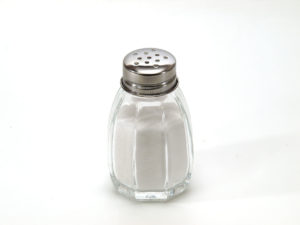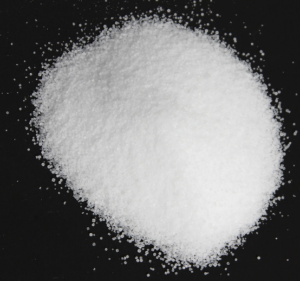Sodium chloride /ˌsoʊdiəm ˈklɔːraɪd/, also known as salt or halite, is an ionic compound with the chemical formula NaCl, representing a 1:1 ratio of sodiumand chloride ions.
Contents
Uses
- Sodium Chloride is more commonly known as table salt, and is used as a preservative in a number of food products, as well as in foods as a flavor additive.
- In cosmetics and beauty products, it is used as an oral care agent, flavoring agent, viscosity increasing agent, and is also seen as a thickener in some cases.
- It is also used as a binding agent and occasionally as an abrasive in scrub products, and can preserve formulas as it does in food packaging (CosmeticsInfo.org and CosmeticsCop.com).
- It is found as an ingredient in oral hygiene products (because of its ability to polish teeth, reduce oral odor), shampoos, fragrance, skin, hair, nail, cleansing, suntan, makeup and bath products. I
- t can sometimes be drying or stripping, however, especially when found in hair products, including shampoos, and is known to reduce moisture in skin and hair.
Benefits
- Fluid Balance: One of the simplest important roles of sodium chloride in the human body is in maintaining fluid balance. Osmosis is the name for the movement of water through permeable membranes toward areas of higher salt — or other soluble particle — concentration. Sodium and chloride in your blood and cells help keep you from losing too much water. For instance, when your kidneys filter blood, they take up sodium and chloride to keep them from being lost in the urine, which also helps draw water out of the urine and back into the blood.
- Other Functions: Sodium is critical to establishing and maintaining a charge differential across each cell’s membrane. Every cell is negatively charged inside, as there’s more sodium outside the cell than inside, and sodium particles are positively charged. This is called the “resting membrane potential,” and allows cells to communicate with one another. Nerve cells and muscle cells depend on the resting membrane potential to function; without it, nerve cells couldn’t send messages and muscle cells couldn’t contract.
Cautions
- Sodium Chloride is considered a relatively safe ingredient, although the Cosmetics Database has given it no official rating but still considers it a low hazard.
- It does note that one or more animal studies showed skin irritation at moderate doses in 1972, and one or more in vitro tests on mammalian cells showed positive mutation results in 1986. The MSDS further corroborated these findings, noting Sodium Chloride as “Slightly hazardous in case of skin contact (irritant), of eye contact (irritant), of ingestion, of inhalation” and “Mutagenic for mammalian somatic cells.
- Mutagenic for bacteria and/or yeast,” which may account for the in vitro test results mentioned by the Cosmetics Database. Whether ingested or applied topically, Sodium Chloride is considered safe and non-carcinogenic or toxic.
Interactions
Please consult with your doctor.
Other names
table salt
References
TruthinAging, https://www.truthinaging.com/ingredients/sodium-chloride
LiveStrong, http://www.livestrong.com/article/416047-how-is-sodium-chloride-healthy/



Soothes irritated skin such as Eczema, Psoriasis, Burns, Dry-Cracked Skin, Bug Bites, Sunburns, etc.The combination of natural and organic ingredients have beneficial properties for skin.
Helps to reduce the look of fine lines and wrinkles. Makes your skin feel softer and smoother. Hypo allergenic and safe. Doesn’t contain harmful chemicals. Good for all skin types, especially sensitive skin. Visit the website at http://deluviausa.com/product-category/deluvia-skin-care/
Click to View what Alicia W., Co-Founder of Delúvia Inc. has to say about how the company started and how its products could help others.
https://www.youtube.com/watch?v=ePrifdk1Wus